Brazil in the Movies
Film was first introduced to Brazil in the late 19th century, when visitors from Europe filmed the exotic landscape. Silent films became popular throughout the country as reliable electricity grew regularly available.
Most films made in Brazil in the early 20th century were by European directors and production companies. With the influence of the French New Wave in the 1960s, however, directors like Glauber Rocha and Nelson Pereira dos Santos rejected what they considered a colonizers view of the country and used the new modernist form of cinema to create personal stories portraying the role of poverty, violence, religion, and family in Brazilian culture.
Many contemporary Brazilian filmmakers retain a taste for social criticism in their work. Government policies that grant large companies tax breaks for funding films have encouraged companies such as Petrobras and Banco do Brasil. The contributions of these companies have helped revitalized the industry, but they also make filmmakers subject to the demands of entrepreneurs.
See examples of well known Brazilian Film and where to watch them listed below.
Contents:
Getúlio Vargas in Power: 1930-45
Experiments in Democracy:1946-1964
Redemocratization: 1985-Present
Colonial Brazil: 1500-1822
Brava gente brasileira (Valient Brazilian People). Director: Lúcia Murat, 2001.Conflicts among Portuguese, Spanish, and indigeous people in late eighteenth-century Brazil.
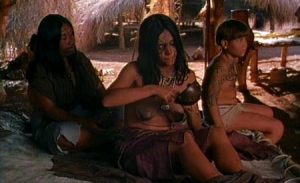
Carlota Joaquina, Princesa do Brasil (Carlota Joaquina, Princess of Brazil). Director: Carla Camurati, 1994. Comic depiction of the Portuguese royal family?s move to Rio de Janeiro in the early nineteenth century.
Como era gostoso o meu francês(How Tasty Was My Little Frenchman). Director: Nelson Pereira dos Santos, 1971.Set in the mid- sixteenth century, a captured French soldier lives among indigenous people who practice ritual cannibalism.
Hans Staden. Director: Luís Alberto Pereira, 1999.German sailor is captured by indigenous people who practice cannibalism.

Os inconfidentes (The Conspirators). Director: Joaquim Pedro de Andrade, 2005. Drama about the conspiracy in the mining region of Brazil against Portuguese rule in the late eighteenth century.

The Mission. Director: Roland Joffé, 1986.In the eighteenth century, Jesuit missionaries operate among indigenous peoples in the borders between Spanish and Portuguese empires.

Quilombo. Director: Carlos Diegues, 1984. A romanticized depiction of the resistance of Palmares, the largest community of runaways in seventeenth-century Brazil.
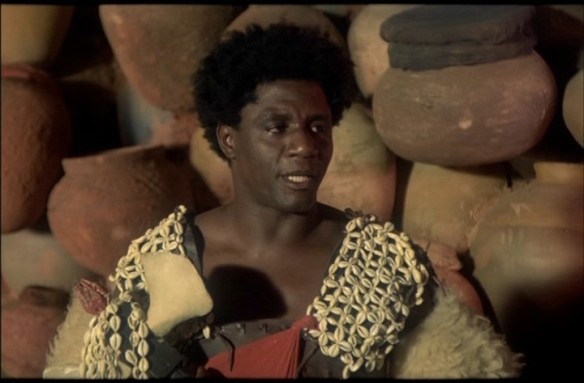
Empire: 1822-1889
Mauá: O imperador e o rei (Mauá: The Emperor and the King). Director: Sérgio Resende. Story of Irineu Evangelist de Souza, Brazilian entrepreneur during the rule of Emperor Pedro II.

Netto perde sua alma (Netto Loses his Soul). Directors: Tabajara Ruas and Beto Souza, 2001. General wounded in the Paraguayan War remembers his involvement in that conflict and the Ragamuffin Rebellion.

First Republic: 1889-1929
Abril despedaçado (Behind the Sun). Director: Walter Salles, 2001. Set in 1910, a northeastern farmer orders his son to avenge the death of his older brother as part of a tragic blood feud with a neighbouring clan.

Casa de areia (House of Sand). Director: Andrucha Waddington, 2005. In 1910, a woman is taken along with her mother to a far-away desert by her husband, and after his passing, is forced to spend the next 59 years of her life hopelessly trying to escape it.

Gaijin: caminhos da liberdade (Gaijin: Paths to Freedom). Director: Tizuka Yamasaki, 1980. Story of post-1908 Japanese migration to Brazil to seek a better life.

A guerra dos canudos (The Battle of Canudos). Director: Sérgio Resende, 1996. Depiction of the conflict of charismatic lay religious leader Antonio Conselheiro and Canudos residents who resist incursions from the federal government during the early republic.

O Quatrilho. Director: Fábio Barreto, 1995. Two Italian immigrant couples struggling to survive in southern Brazil in the early twentieth century find unexpected romantic attractions, leaving their partners behind.

Getúlio Vargas in Power: 1930-1945
Aleluia, Gretchen (Hallelujah Gretchen). Director: Sylvio Beck ,1976.A German family moves to a small town in southern Brazil, where they buy a hotel that becomes a meeting point for Nazi sympathizers.

Baile perfumado (Perfumed Ball). Directors Lírio Ferreira and Paulo Caldas, 1986. Using some footage from the 1930s, a filmmaker befriends Lampião, the Northeastern outlaw, and films his exploits.

O Cangaceiro (The Bandit). Director: Lima Barreto, 1953. Set in the sertão of the Northeast, the right-hand man of the leader of a group of bandits roaming the region falls in love with a school teacher and decides to break away from the group that is
pursued by the police.

O caso dos irmãos Naves (The Case of the Naves Brothers). Director: Luís Sérgio Person, 1967. During the Vargas dictatorship two brothers, after being arrested and tortured, confess to a crime that they did not commit.

Cinema, aspirinas e urubus (Cinema, Aspirins and Vultures) Director: Marcelo Gomes, 2005.A German exile and an acquaintance he meets in northeast Brazil in 1942 travel through the countryside selling aspirin, a new miracle drug.

Madame Satã (Madame Satan). Director: Karim Aïnouz, 2002. This film captures part of the life of João Francisco dos Santos, an Afro-Brazilian petty thief, small-time hustler, and drag performer in 1930s Rio de Janeiro.

Memórias do cárcere (Memoirs of Prison). Director: Nelson Pereira dos Santos, 1984.Writer and leftwing militant Graciliano Ramos?s experiences in prison in the late 1930s and early 1940s.

Xingu. Director: Cao Hamburger, 2011. Story of the Villa Boas brothers contact with Amazonian indigenous peoples as part of the Vargas government?s ?March to the West.?

Experiments in Democracy 1946-1964
O assalto ao trem pagador. (Assault of the Pay Train). Director: Roberto Farias, 1962.Based on the story of outlaw Tião Medonho, who performs the hold-up of a train carrying a small fortune in Rio de Janeiro in 1960.

Capitães da areia (Captains of the Sands). Directors: Cecília Amado and Guy Gonçalves, 2011. Inspired by Jorge Amado?s novel of the same name, a gang of street children ranging in ages from seven to sixteen survive through begging, gambling, stealing, and burglary in Salvador, Bahia in the 1950s.

Corações sujos (Dirty Hearts). Director: Vicente Amorim, 2012. Based on an historical phenomenon, at the end of World War II, the vast majority of the Japanese immigrants and their descendants living in Brazil refuse to believe that Japan has lost the war and persecute those in the community who dismiss that the news as American propaganda.

Deus e o diabo na terra do sol (Black God, White Devil). Director: Glauber Rocha,1964. This classic example of the Cinema Nova, directed by a leading figure in the movement, is set in the Brazilian Northeast and deals with the socio-economic, political, and cultural challenges of the region.

Rule of the Military 1964-1985
O ano que os meus pais saíram de férias (The Year My Parents Went on Vacation). Director: Cao Hamburger, 2007. A young revolutionary couple leave their son with his grandfather in the Jewish neighborhood of São Paulo and go into hiding amidst the young boy?s anticipation of the 1970 World Cup soccer match and his anxious concern about when his parents will return.

O bandido da luz vermelha (The Red-Light Bandit). Director Rogério Spanzerla, 1968.Inspired by the crimes of a real-life burglar known as the Red-Light Bandit, the film is a part of the cinema marginal (marginal cinema) movement.

Batismo de sangue (Baptism by Blood). Director: Helvécio Ratton, 2007. During the military dictatorship, Dominican friar support the revolutionary guerrilla organization, National Liberating Alliance, and are arrested and tortured for their actions.

Cine Holliúdy. Director: Halder Gomes, 2013
The massive diffusion of television in the backlands of Brazil in the 1970s threatens the
livelihood of a small-town movie theater owner and the cinema that he loves.

Deslembro (Unremembering). Director Flavia Castro, 2018.
A family of political exiles returns from Paris to Rio in 1979 and faces adaptation to a new reality as the daughter seeks the truth about her disappeared father.

Eles não usam black-tie (They Don’t Wear Black-tie). Director: Leon Hirszman, 1981.Inspired by a 1950s play but set during the labor upsurge in the late 1970s, a family must dealwith a strike to improve their standard of living, which also confronts the military?s economic and labor policies.

Redemocratization: 1985-present
Aquarius. Director: Kleber Mendonça Filho, 2016. A retired journalist and writer fights a developer who wants her to vacant her beach-front apartment so that a new, much larger apartment building can be built on that location.
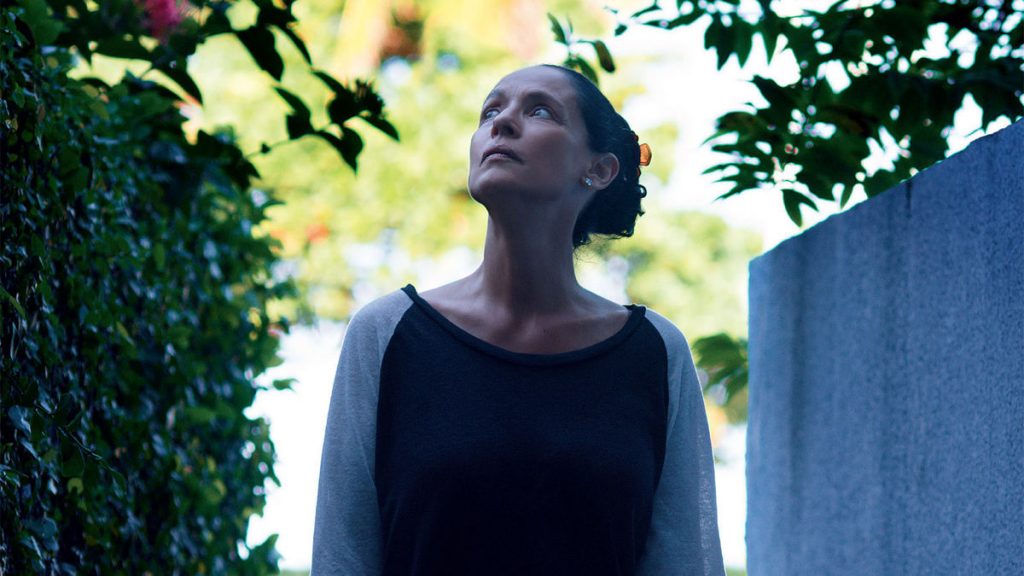
Bacurau. Director: Juliano Dornelles, Kleber Mendonça Filho, 2019. Set in the near future, a woman comes home to her matriarchal village of Bacurau in the semi-arid sertão to attend her grandmother?s funeral and discovers that a corrupt government has forsaken the village, which needs to resist.
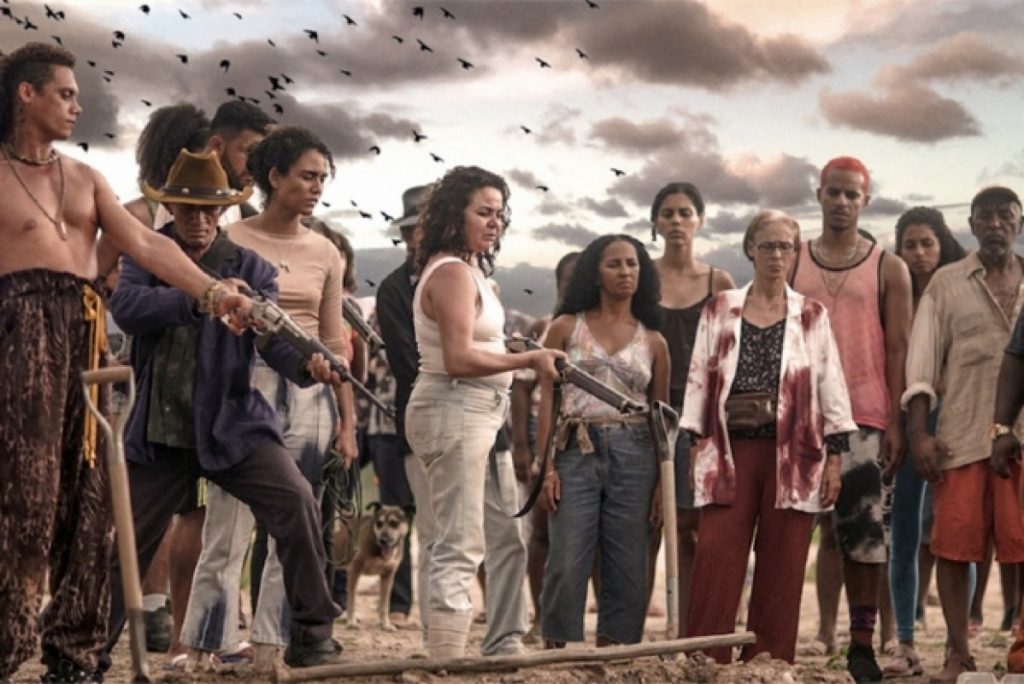
Benzinho (Loveling). Director: Gustavo Pizzi, 2018. A lower middle-class family barely managing to hold itself together faces challenges when the oldest son wins a sport scholarship to study in Europe.

Bicho de sete cabeças (Brainstorm). Director: Laís Bodanzky, 2000. The father of a middle-class teenager discovers his son is smoking marijuana and places him in amental hospital, where conditions are horrible.
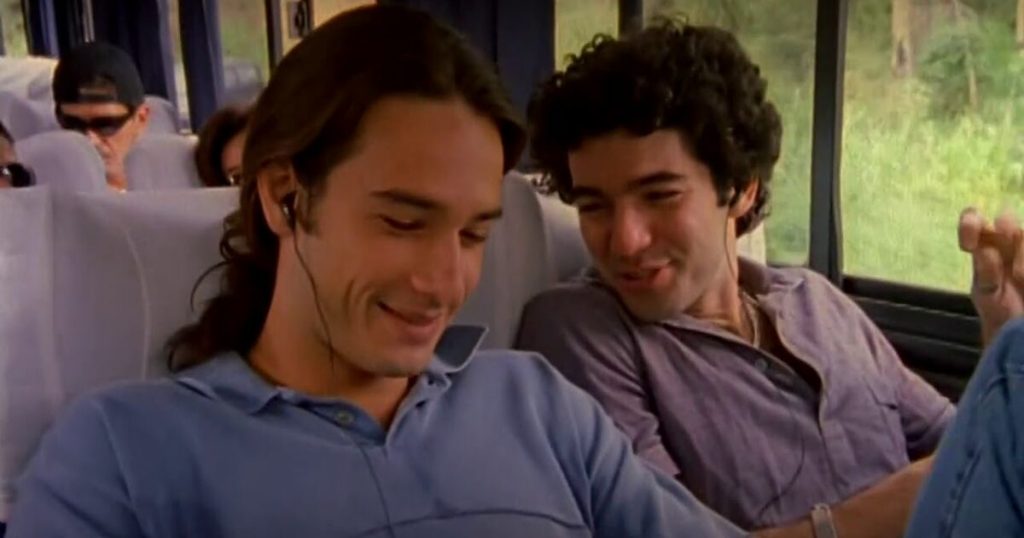
O som ao redor (Neighboring Sounds). Director: Kleber Mendonça Filho, 2012.
A middle-class neighborhood in Recife living with a sense of fear about crime find their
anxieties alleviated when a private security firm offers protection.

Tatuagem (Tattoo). Director: Hilton Lacerda, 2013.
An experimental theater group in Olinda, Pernambuco in the late 1970s pushes the limits of censorship and social boundaries about gender, sexuality, and nudity.

Tinta bruta (Hard Paint). Directors: Felipe Matzembacher and Márcio Reolon, 2018.
A shy young man living in Porto Alegre comes out of his shell during chatroom performances when he strips and smears his body with neon paints.

Tropa de Elite (Elite Squad). Director: José Padilha, 2007.
An elite corps of military police fight drug trafficking and police corruption in Rio de Janeiro.



